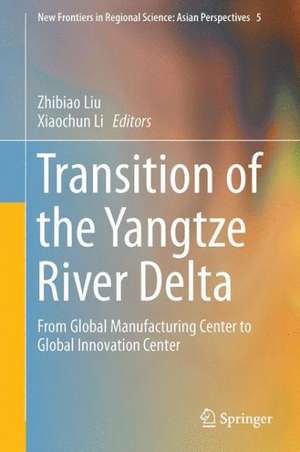Transition of the Yangtze River Delta: From Global Manufacturing Center to Global Innovation Center: New Frontiers in Regional Science: Asian Perspectives, cartea 5
Editat de Zhibiao Liu, Xiaochun Lien Limba Engleză Hardback – 11 mar 2015
| Toate formatele și edițiile | Preț | Express |
|---|---|---|
| Paperback (1) | 385.62 lei 43-57 zile | |
| Springer – 9 oct 2016 | 385.62 lei 43-57 zile | |
| Hardback (1) | 392.97 lei 43-57 zile | |
| Springer – 11 mar 2015 | 392.97 lei 43-57 zile |
Din seria New Frontiers in Regional Science: Asian Perspectives
- 15%
 Preț: 652.64 lei
Preț: 652.64 lei - 18%
 Preț: 742.00 lei
Preț: 742.00 lei - 15%
 Preț: 645.96 lei
Preț: 645.96 lei - 18%
 Preț: 798.18 lei
Preț: 798.18 lei - 18%
 Preț: 728.74 lei
Preț: 728.74 lei - 18%
 Preț: 724.14 lei
Preț: 724.14 lei - 18%
 Preț: 733.33 lei
Preț: 733.33 lei - 15%
 Preț: 693.25 lei
Preț: 693.25 lei - 15%
 Preț: 640.06 lei
Preț: 640.06 lei - 15%
 Preț: 702.87 lei
Preț: 702.87 lei - 15%
 Preț: 718.61 lei
Preț: 718.61 lei - 18%
 Preț: 786.36 lei
Preț: 786.36 lei - 18%
 Preț: 1110.72 lei
Preț: 1110.72 lei - 15%
 Preț: 644.18 lei
Preț: 644.18 lei - 18%
 Preț: 787.78 lei
Preț: 787.78 lei - 15%
 Preț: 699.45 lei
Preț: 699.45 lei - 18%
 Preț: 897.47 lei
Preț: 897.47 lei - 15%
 Preț: 643.34 lei
Preț: 643.34 lei -
 Preț: 395.25 lei
Preț: 395.25 lei - 18%
 Preț: 892.42 lei
Preț: 892.42 lei -
 Preț: 386.39 lei
Preț: 386.39 lei - 24%
 Preț: 594.43 lei
Preț: 594.43 lei - 18%
 Preț: 900.31 lei
Preț: 900.31 lei - 15%
 Preț: 714.02 lei
Preț: 714.02 lei - 15%
 Preț: 698.62 lei
Preț: 698.62 lei - 24%
 Preț: 632.82 lei
Preț: 632.82 lei - 18%
 Preț: 1244.59 lei
Preț: 1244.59 lei - 15%
 Preț: 644.63 lei
Preț: 644.63 lei - 18%
 Preț: 785.42 lei
Preț: 785.42 lei - 15%
 Preț: 639.73 lei
Preț: 639.73 lei -
 Preț: 357.81 lei
Preț: 357.81 lei - 18%
 Preț: 1111.53 lei
Preț: 1111.53 lei - 18%
 Preț: 721.33 lei
Preț: 721.33 lei
Preț: 392.97 lei
Nou
Puncte Express: 589
Preț estimativ în valută:
75.22€ • 81.73$ • 63.22£
75.22€ • 81.73$ • 63.22£
Carte tipărită la comandă
Livrare economică 21 aprilie-05 mai
Preluare comenzi: 021 569.72.76
Specificații
ISBN-13: 9784431551775
ISBN-10: 4431551778
Pagini: 241
Ilustrații: X, 241 p. 67 illus., 59 illus. in color.
Dimensiuni: 155 x 235 x 20 mm
Greutate: 0.53 kg
Ediția:2015
Editura: Springer
Colecția Springer
Seria New Frontiers in Regional Science: Asian Perspectives
Locul publicării:Tokyo, Japan
ISBN-10: 4431551778
Pagini: 241
Ilustrații: X, 241 p. 67 illus., 59 illus. in color.
Dimensiuni: 155 x 235 x 20 mm
Greutate: 0.53 kg
Ediția:2015
Editura: Springer
Colecția Springer
Seria New Frontiers in Regional Science: Asian Perspectives
Locul publicării:Tokyo, Japan
Public țintă
ResearchCuprins
Ch1 Development Strategy, Restructuring and Upgrading, Innovation-driven Development and Transformation of the Development Mode of Service Industry (Zhibiao Liu).- Ch2 The Distribution of Space Economy: From “Massive Economic” to Modern Industrial Clusters (Shouhua Wei,Xinlei Lv, Haiyan Cong).- Ch3 The Dynamism of Transformation of the Yangtze River Delta from Global Manufacturing Center into Global Innovation Center (Shouhua Wei, Xiaojing Liu, Mu Cheng.- Ch4 Industry Selection: Evolution from the Undertaking of Manufacturing Abroad to the Innovation and Entrepreneurship of Emerging Industries in the Yangtze River Delta (Jianghuai Zheng, Yongchun Huang).- Ch5 The transformation from factor input-driven growth model to innovation-driven growth model (Yang Ge, Ling Guan).- Ch6 Analysis of the transformation of production factors in the economic transition in the Yangtze River Delta (Xiaochun Li, Juan Xia).- Ch7 Local Government Competition and Industrial Structure Convergence(Fuxiang Wu).- Ch8 Industry Coordination in the Integration of the Yangtze River Delta: Analysis of Endogenous Relationship between Manufacturing and Service Industry (Jing Jiang).- Ch9 Reverse Outsourcing of Research & Development: A Growth Path of Chinese Firms—Based on the Case Study of Automobile Self-Brand in the Yangtze River Delta Region (Danlu Liu and Zhonggang Yue).- Ch10 The Development of Low Carbon Economy and the Policies of Environmental Protection under Selective Opening (Maoliang Bu).
Recenzii
Notă biografică
Textul de pe ultima copertă
This is the first English book that presents a professional analysis of the recent dynamic movement of the Chinese economy by focusing on the Yangtze River Delta region, which is the main engine of the Chinese economy. The impact of the international financial crisis on China’s economic development requires a change from the first wave of economic globalization oriented toward exports to the second wave of economic globalization characterized by expanding domestic demand. Taking this economic aspect into consideration, the following are proposed in this book: 1) expansion of the level of openness in the process of increasing domestic demand means shifting the industrial focus from manufacturing to the service industry; 2) promotion of the globalization of local services should be based on the globalization of local manufacturing; 3) the Yangtze River Delta region should aim at its own strategic positioning under new, changed circumstances and should achieve modernization in advance with the concept of integrative development; 4) Establishment of a support system is essential meanwhile for this area to develop an innovative economy and to promote the transition from manufacturing to promoting emerging industries, including a modern service industry. The book has an underlying concept, namely, that the key to economic transformation is to start the development of modern services and that only by transforming the development pattern of the service industry can the transition and upgrade of the economy be effectively achieved. For this purpose further urbanization and advancing the transformation from low-tech to high-tech industries by the effective development of industrial clusters is advocated. To ensure that these conclusions are based on a solid analysis, the authors draw heavily upon empirical analyses employing modern econometric methods and make use of economic theories such as endogenous growth theory and spatial economic theory.
Caracteristici
Presents an empirical analysis of the Yangtze River Delta using contemporary econometric techniques Focuses on regional study of the development and transformation in the Yangtze River Delta economy Is based on an economic theoretical background that includes endogenous growth theory, game theory, and spatial economics












